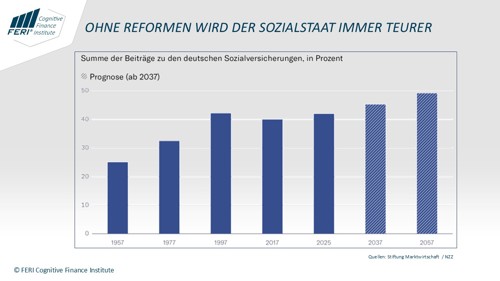T +49 (0) 6172 916-3631
info@feri-institut.de
Rathausplatz 8 - 10
D-61348
Bad Homburg
Germany is currently engaged in a heated debate on this issue—even within the government! Let's take a look at the facts: At around 30% of GDP, social benefits in Germany in 2024 will be only slightly above the average for the last 30 years. However, this figure was only 24% in 1990—meaning that the system has become significantly more expensive since then.
In Europe, Germany thus affords itself a rather generous social welfare system, whose share of GDP is surpassed only by France, Austria, and Italy. However, the core of the problem lies in future burdens, primarily due to demographic change.
This is due to a massive shift in the age structure with very clear effects: the baby boomer generation will soon be reaching retirement age, the significant reversal of the age pyramid implies less economic growth, and the aging of society means higher spending on healthcare and nursing care in the future.
This puts the German social security system under pressure from two sides: on the one hand, there are fewer contributors to the social security funds, but at the same time there is more expenditure on pensioners, the elderly, and those in need of care. Without structural reforms, social security contributions in Germany are therefore likely to continue to rise sharply in the future (see chart).
The FERI Cognitive Finance Institute has already conducted several comprehensive studies on these and other demographic effects, most recently in a special analysis on the topic of longevity.
The analyses can be downloaded in German from the download area on this page.

T +49 (0) 6172 916-3631
Rathausplatz 8 - 10
D-61348 Bad Homburg